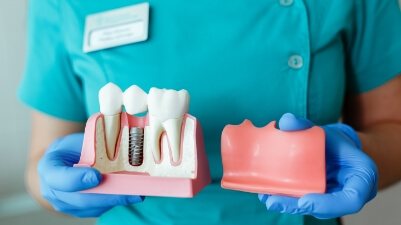Dental Implants – Houston, TX
Long-Lasting Replacement Teeth You Can Trust

Tooth loss can take a dramatic toll on your self-confidence in addition to your oral health. Traditional tooth replacements like dentures and dental bridges have been around for generations, and as lifelike as they might appear, many patients are dissatisfied by how unnatural the results feel. With the transformative power of dental implants, our team can give you long-lasting replacement teeth you can trust. If you’re ready to learn how dental implants can improve your smile, confidence, and overall quality of life, please give our dental office a call today!
Why Choose Tamborello Dental Associates for Dental Implants?
- Dental Implants Conveniently Placed & Restored In-House
- Tamborello Is a Master of the Academy of General Dentistry
- Low-Interest Dental Financing Available
Preventive Dentistry Restorative Dentistry Cosmetic Dentistry Orthodontic Services Sedation Dentistry Emergency Dentistry Sleep Apnea TMJ/TMD Therapy View Our Services
What Are Dental Implants??
So, why are dental implants the best choice for your smile? It’s simple – unlike other solutions, they replicate the entire structure of your natural tooth, from the crown (the white part) down to the root beneath the gumline. The dental implant itself is a titanium post that acts as a root after being surgically placed in the jaw. It then fuses with the surrounding bone tissue, allowing it to support any number of replacement teeth via a metal abutment fixture. The unique three-part structure of dental implants enables them to look, feel, and function just like your real pearly whites.
The 4-Step Dental Implant Process

Because their structure is more complex than that of dental bridges and dentures, dental implants require a more involved treatment process. In the end, it will probably take several months and multiple appointments until your new teeth are complete. However, your implants can last a lifetime with the right care, so we think you’ll find them more than worth the wait!
As an added bonus, our team can perform the surgical portion of the dental implant treatment right here in our dental office, unlike many general dentists. This streamlines your treatment to make it more convenient and affordable overall.
Every patient’s smile is different, so the details of the dental implant process will vary slightly between patients. That said, you can expect to go through these four basic steps.
Initial Dental Implant Consultation

To begin your journey to a complete smile, you’ll first need a consultation with a qualified implant dentist to ensure you’re a candidate for dental implants. They’ll perform a visual examination and learn more about your dental, medical, and lifestyle history. They will also review a CT scan of your jaw. Depending on the results, you may need additional procedures before moving forward with your placement surgery, like periodontal therapy or bone grafting.
Dental Implant Surgery
After you’ve healed from any previous treatments, you'll be scheduled for your placement surgery. Sedation or anesthesia is used to ensure you’re comfortable as we open your gum tissue to gain access to your jawbone. Using computer-guided technology, a small hole is strategically drilled into your jaw to allow a titanium implant post to be inserted into the bone. Your gum tissue is stitched closed, and the healing process will begin.
Dental Implant Osseointegration & Abutment

Over the next several weeks, your jawbone will fuse with the post through a process called osseointegration. The post acts as a tooth root, which stimulates the bone to encourage new growth. Your bone will integrate with the post, allowing it to stay in place forever with the right aftercare, like maintaining your oral hygiene.
After your jaw has healed, you’ll need a second minor surgery to attach an abutment to the post, which is a special fixture between the implant and your restoration. A local anesthetic is used to provide a comfortable experience as your gum tissue is opened to expose the post to attach the abutment. You’ll spend the next two weeks healing as your gums seal around the abutment to keep bacteria out while also creating a natural-looking gum line.
Delivery of Dental Implant Restoration(s)

While you’re healing from your abutment procedure, the dental lab will be creating your new restoration from all-ceramic material. It’s made to meet your exact specifications, including the color, size, and shape it needs to blend in with any remaining natural teeth.
Although your restoration isn’t made of metal, it will be strong and durable to withstand the pressure of biting and chewing. In fact, you can regain as much as 70% of your natural biting force to enjoy your favorite foods again.
Benefits of Dental Implants

Dental implants are the next best thing to what Mother Nature gave you. Knowing that, it’s easy to see why they’ve become one of the most popular methods of tooth replacement! Their unique placement in the jawbone gives them unmatched benefits that dentures or bridges alone cannot provide. Not only are they very natural-looking, but they can drastically improve your confidence, health, and overall quality of life.
Day-to-Day Benefits

Since we use our teeth for everyday tasks like eating, speaking, and smiling, it makes sense to want a solution that’ll allow you to live your day-to-day life with ease. With dental implants, you can enjoy the following benefits:
- Greater chewing ability. Because dental implants are surgically inserted into the jawbone, they can effectively replace the entire structure of missing teeth from the roots up to the chewing surface. As such, they can withstand the chewing of virtually any food!
- Easy oral hygiene and maintenance. You don’t need to purchase special products or incorporate complex steps into your oral hygiene routine to care for implants. All you have to do is brush, floss, and rinse as you normally would with your natural teeth.
- Boost of confidence. Dental implants remain firmly in place, reducing unwanted movement. They will never move in your mouth, meaning you can use your pearly whites with confidence!
Health Benefits

The advantages of dental implants go beyond improving your everyday quality of life. Although you may not see it right away, they can improve your health in the following ways:
- Jawbone stimulation. Implants provide the jawbone with internal support, helping prevent the bone loss that’s common after tooth loss.
- Reduced risk of oral health issues. By replacing the gaps in your smile, you can lower your risk of problems like gum disease and further tooth loss.
- No modification of remaining teeth necessary. Unlike dental bridges, your healthy teeth do not have to be altered to get dental implants.
Long-Term Benefits

By choosing to get dental implants now, you can reap several short-term and long-term benefits. Some long-term advantages include:
- High success rate. Dental implants have an impressive success rate of about 95 percent even 20 years after they’ve been placed!
- Maintain a youthful appearance. Since implants stimulate the jawbone, they can help prevent the aged look that often accompanies tooth loss.
- Natural-looking and long-lasting results. Your newly rebuilt smile can easily last 30+ years with proper care and maintenance. For some people, dental implants can last a lifetime!
Who Dental Implants Can Help

If you’re a generally healthy adult who has lost one or more teeth, then chances are you could benefit from getting dental implants. This treatment is incredibly versatile, so much so that we can use it to bring back any number of missing teeth! The type of restoration that we select for you will be influenced by the extent of your tooth loss:
Missing One Tooth

Instead of shaving down two of your natural teeth to place a bridge, we can simply insert a single dental implant post into the space where the missing tooth’s roots once were. Once the post has merged with your jawbone, we’ll secure an abutment and a customized dental crown on top to complete the visual section of your smile.
Missing Multiple Teeth

To replace several consecutive missing teeth at the same time, we can place one implant post at each end of the empty space. These posts will anchor a dental bridge without the need to alter your existing tooth structure. If you’re missing multiple teeth throughout the mouth, we can secure a partial denture onto a small number of expertly place implants.
Missing All Teeth

Even patients who have lost all their teeth on one or both arches can enjoy dental implants. In most cases, four to eight implants are all that is needed to support a full denture. Implant dentures prevent many of the inconveniences that come with traditional dentures, including slippage, speech difficulties, and dietary restrictions.
Understanding the Cost of Dental Implants

If you’ve lost one or more teeth, you have more options than ever to rebuild your smile using the latest innovations in dentistry. Dental implants are unlike any other treatment because they recreate the entire tooth structure. You’ll enjoy a close replica of your natural smile with dental implants, but how much do they cost? Here’s how much you can expect to pay when replacing your missing teeth with dental implants.
Request an AppointmentTypes of Dental Implants

There are various factors influencing the amount you will pay for dental implants, like the materials used and the number of teeth you’re restoring. You can expect to pay more if you’re replacing several teeth because you’ll require multiple posts and abutments. Not to mention, you’ll need a larger restoration. We’ll provide you with a custom estimate during your initial consultation and explain the costs associated with your procedure.
What Are the Stages of Dental Implant Treatment?

Since a dental implant mimics your tooth from the root up, your treatment plan will include several steps. This can make it easier to afford your new smile because you won’t need to pay the entire amount at once. Instead, you can pay for each step in your plan separately. While every treatment differs, many patients will need:
- Initial Consultation – You’ll need an examination and a CT scan to assess your oral health and structures.
- Additional Treatments – Many patients need additional procedures before their placement surgery, like tooth extractions, periodontal therapy, or bone grafting.
- Sedation or Anesthesia – You’ll need sedation or anesthesia to ensure your comfort during your procedure.
- Placement Surgery – Titanium implant posts are surgically placed into your jawbone.
- Abutments – Each post will need an abutment to connect your restoration to your posts.
- Restoration – Your new teeth are made of all-ceramic material to look and feel natural.
Are Dental Implants Worth the Investment?

Dental implants are more expensive upfront than traditional treatments, but did you know they are more affordable long-term? Dental implants have the potential to last for decades with the right aftercare, so you’ll never need to pay to have them replaced.
Dental implants are also the only treatment that preserves your jawbone, which protects any remaining natural teeth from shifting out of alignment. Stopping dental drift improves your oral health because it lowers your risk of tooth decay and gum disease, reducing your overall dental expenses.
Can I Use My Dental Insurance to Pay for Dental Implants?

Many dental insurances cover a portion of the cost of the treatment after reaching your deductible, but every plan differs. We’ll work on your behalf with your insurance carrier to file the necessary claims and forms to lower your out-of-pocket expense. We’ll take the time to explain how your benefits are being used and if you owe a remaining balance. Our dnetal office accepts a variety of payment options to keep your new smile affordable, like third-party financing.
Take your first step toward a complete smile by scheduling your consultation for dental implants. We’ll replace your missing teeth without breaking the bank.
Dental Implant FAQs

You may have heard that dental implants are is the best form of tooth replacement available, but if you’re like most people, you still have some questions about how the process works. To help you out, Dr. Tamborello, Dr. Boone, and Dr. Devlin have answered some of the most commonly asked questions. If you want to know more about the procedure, feel free to contact us to request a visit.
Is dental implant surgery painful?
One of the main concerns patients have about dental implants is whether they’ll be in pain during the placement process. If you, too, are worried about having to endure a torturous treatment, you need not have any fear. Dr. Tamborello, Dr. Boone, or Dr. Devlin will make sure that before any work starts, the treatment site will be completely numb so that you can be relaxed throughout the implant surgery process.
If you’re feeling overly anxious, we can help to calm your nerves with either nitrous oxide or oral conscious sedation.
How long will it take for me to heal from getting dental implants?
While each situation is unique, in most cases, you can expect to heal from the initial placement of a dental implant in three to six months. During this period, the implant will also fuse with the underlying jawbone through a process called osseointegration. This will provide a sturdy foundation that only pales in comparison to your original tooth root.
After you’ve sufficiently recovered, Dr. Tamborello, Dr. Boone, or Dr. Devlin will place a titanium abutment that will act as an anchor to allow a final restoration to be added, which will leave you fully restored.
Will my smile look natural with dental implants?
When it comes to aesthetics, the results delivered by dental implants stand in a class of their own. While other procedures only restore a smile from the gums up, a dental implant replaces a tooth from the root to the crown. Thus, it will leave you with a smile that looks like you were born with it.
This feature offers even more than cosmetic benefits, as the added security provided by the implant helps to prevent any slipping and the gum irritation that can ensue.
Will my dental insurance cover the cost of a dental implant?
Most dental insurance holders won’t cover the cost of dental implant placement. However, your coverage may be applied toward a portion of the cost of any restorative care you may need. Additionally, your plan may provide coverage for the placement of the final restoration.
We understand that some of our patients may be more cost sensitive. Thus, we’ve partnered with CareCredit and Lending Club to provide alternative forms of financing. That means no one has to miss out on receiving the vital dental care they need.
How Successful Are Dental Implants?
Dental implants have an impressive success rate, exceeding 95% when expertly placed by a skilled professional. However, the longevity and success of your implants ultimately depend on diligent aftercare. Maintaining oral hygiene, attending routine checkups, and adopting a healthy diet can significantly contribute to their success. It's worth noting that success rates may vary based on the implant's location as well. For example, molars are subjected to more chewing strain, which means they have a slightly higher likelihood of complications compared to front teeth.
What Can Cause Dental Implants to Fail?
Although it’s rare, dental implant failure can occur for many different reasons. In most cases, it’s the result of peri-implantitis or failed osseointegration.
Peri-implantitis, a gum disease linked to poor oral hygiene, poses a risk by damaging the bone and gums supporting the implant. Additionally, failed integration with the jawbone can occur, particularly in cases of low jawbone density. Some other contributing factors include chronic teeth grinding, tobacco use, poor oral hygiene, certain medications, head and neck radiation, and health conditions like diabetes, cancer, osteoporosis, and autoimmune disorders. Rest assured – we’ll offer guidelines to minimize these risks and enhance the chances of successful dental implant outcomes.
Will I Have to Take Off Work for Dental Implant Surgery?
For dental implant surgery, most patients typically only need to take one or possibly two days off from work. However, individual cases may vary, and we’ll provide personalized recommendations based on your unique situation.
If your job involves physical demands, it's recommended to consider taking at least three or four days off. Engaging in heavy exercise shortly after the procedure could divert blood from the implant site and potentially delay healing. Planning your surgery on a Thursday or Friday might be a practical choice for a smoother recovery and minimal disruption to your work schedule.
Can I Get Dental Implants If I Smoke?
Yes, it is possible to get dental implants if you smoke! However, it's important to note that smokers face a higher risk of dental implant failure. Smoking, whether through cigarettes, chewing, or vaping, contributes to dry mouth, delays healing, and interferes with the implants' ability to successfully fuse with the jawbone.
Additionally, smoking increases the likelihood of complications such as dry sockets, which can dislodge the blood clot forming over the implant site. To improve the chances of a successful implant, smokers are advised to quit at least two weeks before the procedure and abstain from smoking for a minimum of two to three months post-surgery. Of course, using this opportunity to quit smoking altogether can significantly enhance oral health and overall well-being.
For more details about the two programs and to determine which is best suited to meet your needs, feel free to contact our dental office to speak with an associate.

